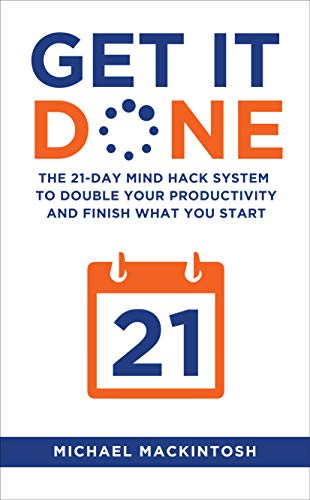
Introduction
- This book is aimed at creative entrepreneurs but I believe that educational leaders can learn from it as well. It makes very big promises, but depending on where you are it should help you focus on what’s important, increase your productivity, and finish your most important projects. It also reminds us all to build in time for rest, relaxation, and celebrating our accomplishments.
Part I – 11 Essential Mind Hacks to Make Things Happen
- 1. The Prolonged Pain or the Short-Lived Pain: If you continue doing things that are inefficient and less effective you are inviting long-term pain. Change in the near term can be painful too, but if it leads to success you won’t have to deal with it in the long-term.
- 2. The Defining Choice: Acting differently and thinking differently is a choice. Keep in mind it is the only way you are likely to get different results.
- 3. The 80/20 Rule: This rule states that 80% of your input or effort leads to 20% of your outputs or results. Therefore, the opposite has to be true that 20% of your effort leads to 80% of your results. The trick is to identify the activities that produce 20% of your output and either do them less or do them when you are not so sharp.
- 4. Good is Good Enough: The old saying “the perfect is the enemy of the good” applies here. It is important sometimes to stop when you have reached the good enough point in a job unless it’s a job that has to be perfect like a computer program.
- 5. The Delusion of Time Management: The idea here is that you only have NOW in terms of doing something. Even if you are thinking about the future you are doing it NOW. Trying to micromanage your schedule is not likely to lead to great productivity. Rather than thinking about managing time, think about managing your thoughts, words, actions, energy, and focus. As you move through the day ask if what you are doing is moving directly toward your goals. Make your most important work a priority. Organize your day to make the most of your energy. If you are a morning person like me, save the most important work for the morning. (Doug: Yes, I’m writing this in the morning.) Recognize when you are a tired, hungry, or distracted and do what it takes to recharge. It’s not how much time you put into something, it’s how much high-quality energy you invest.
- 6. The Resistance: You can’t do something new, significant, and meaningful without resistance so get ready for it. Some can come from your lower self that is comfortable with the status quo. Be alert and look for it within and without so you can take it on.
- 7. Fears and Hallucinations: Fears can be real or irrational. They can be healthy and necessary for success. They can also arise when it’s not required. Unconscious fears include the unknown, failure, and not being good enough. Once you identify them you can accept that they only exist in your mind. This should help prevent the destructive worry that come with them.
- 8. Focus: You don’t want to try to make all of your dreams come true at the same time. The idea here is to bring one idea to completion before you begin another one. Fear could be part of the problem for people who try to do too many things at once.
- 9. How to Overcome Self-Doubt: This can sabotage you before you begin. Michael suggests that you focus on the people who will be helped if you complete what you are doing and realize that self-doubt, like most fears, is also irrational.
- 10. Do It Now: Everything happens in the now, and now won’t last forever. This should help you get going and avoid procrastination.
- 11. Do Less Work to Get More Done: You don’t do your best work when you work too hard. You are more likely to make mistakes and quality is likely to go downhill. Be sure to build rest and recharge into your game plan. Sleeping on a problem or just taking a walk can help you solve it. You are also more likely to screw up your family life and other important relationships. You still have to work hard, but working too hard can even make your sick.
DrDougGreen.com If you like the summary, buy the book





